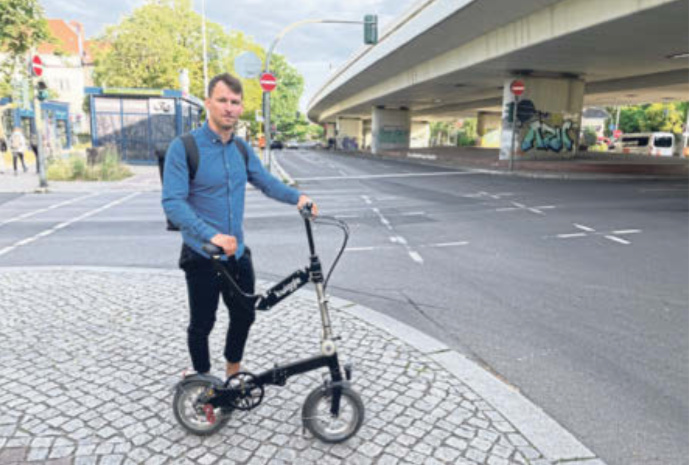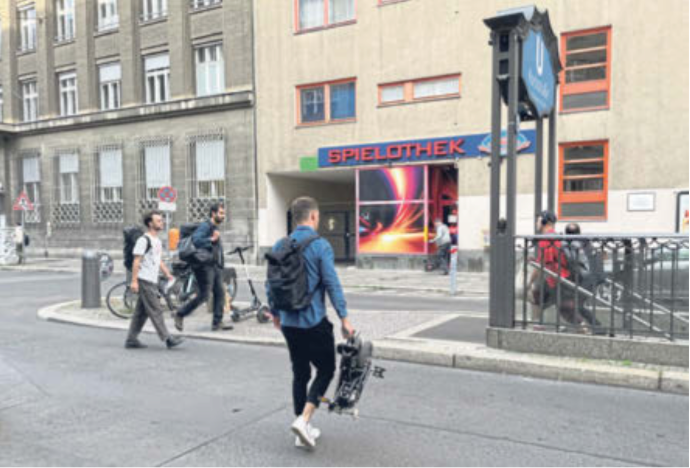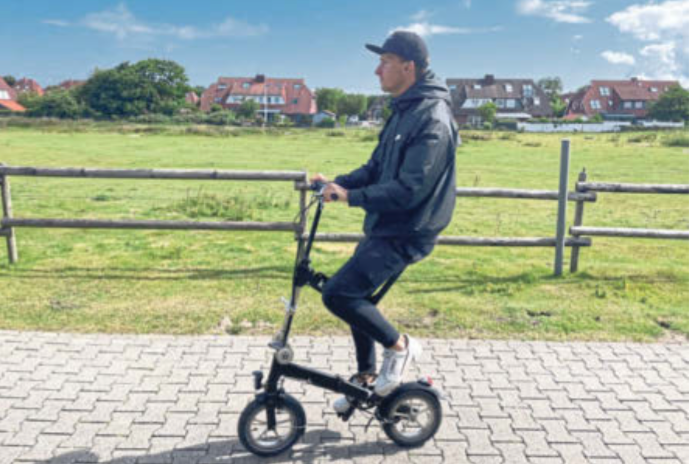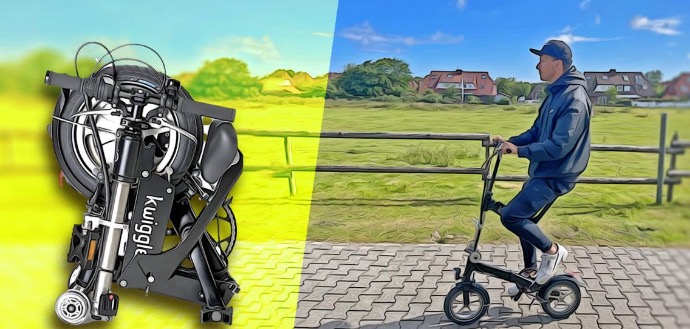The following article is an imprint from the publication of the Kwiggle folding bike long-term test (500km) on Welt.de, to offer our visitors a translation in all available languages.
The original can be found here:
DIE WELT: This-folding-cycle-should-conquer-Germany
The Kwiggle is the world's smallest folding bike, and our author tested it for six weeks in everyday use. His conclusion: it has what it takes to revolutionize Germany's mobility. Nevertheless, the reactions to this vehicle reveal a surprising amount about our society..
THE WORLD, FRIDAY, JULY 29, 2022
Brieselang, a backwater in Brandenburg, located 30 kilometers west of Berlin-Mitte. Once an hour, the regional train leaves for the capital. At 2:06 the last. In itself inconvenient that my former classmate celebrates here of all places, in a night from Saturday to Sunday, in his 30th birthday.
But moreover, he built his house 30 minutes walk from the station. A bus already at the outward journey at 19:00 missing. An Uber? - As if. Fortunately, I have a Kwiggle with me, the smallest folding bike in the world, and cover the almost three kilometers in seven minutes.
But it doesn't even have to be such a special case. In the midst of the traffic turnaround and "fuel inflation," many Germans are faced with the problem of having to drive long distances every day, especially to work. Not least my school friend, who as a policeman on shift duty has to travel daily from Brieselang to the center of Berlin.
If politics and the population have their way, fewer and fewer commuters should use the car. Often, however, the connections are so meager that only conviction offenders follow through. According to the latest Destatis figures, just under 70 percent of all commuters stay with the car - village and surrounding areas often have no other choice.

The answer could be "mobility to go." Leave car, pull up to station or stop, hop on mass transit. Stow portable vehicle, drive, get off and again cover the last (kilo) meters under your own power.
An increasing number, at least in Berlin's public transport system, are trying their luck by bicycle. But the conventional two-wheeler, soon to be two meters long, has natural limits: The few selected bicycle cars in Regio, And S-Bahn are all too quickly full. The bikes annoy those who carry them and other passengers alike.
They block seats, sometimes trains have to be let through to fit you in. They require an additional ticket, which is often as expensive as the single ride ticket. On buses and streetcars, it's usually not possible to take them anyway. And how will it be when more people actually switch to bicycles?
The answer could be "mobility to go." Leave car, pull up to station or stop, hop on mass transit. Stow portable vehicle, drive, get off and again cover the last (kilo) meters under your own power.
An increasing number, at least in Berlin's public transport system, are trying their luck by bicycle. But the conventional two-wheeler, soon to be two meters long, has natural limits: The few selected bicycle cars in Regio, And S-Bahn are all too quickly full. The bikes annoy those who carry them and other passengers alike.
They block seats, sometimes trains have to be let through to fit you in. They require an additional ticket, which is often as expensive as the single ride ticket. On buses and streetcars, it's usually not possible to take them anyway. And how will it be when more people actually switch to bicycles?
A bike for commuters?
Or a joke?
The Kwiggle is the world's smallest folding bike. Our author has tested it for six weeks in everyday life..
A bike for commuters?
Or a joke?
The Kwiggle is the world's smallest folding bike. Our author has tested it for six weeks in everyday life..
Into this market gap pushes the Kwiggle. The only folding bike in hand luggage format is supposed to fit under every seat and in every locker, I am promised. At the handover, inventor and CEO Karsten Bettin confidently blows my mind: "There will never be a smaller folding bike, I'm absolutely sure of that."
Bettin assembles the Kwiggle with ten employees in Hanover, receiving parts from 35 suppliers, mainly from Germany and Italy. He currently churns out a few thousand a year, but could scale quickly with the right investor - Carsten Maschmeyer is among those he has turned down - he says.
WELT tested the Kwiggle for six weeks in everyday life in all kinds of situations, routes and vehicle combinations - from bus, ICE, car to ferry. For a larger group of Germans, it could bring relief, that much is revealed. And yet I've never driven a vehicle that has divided minds like the Kwiggle.
Into this market gap pushes the Kwiggle. The only folding bike in hand luggage format is supposed to fit under every seat and in every locker, I am promised. At the handover, inventor and CEO Karsten Bettin confidently blows my mind: "There will never be a smaller folding bike, I'm absolutely sure of that."
Bettin assembles the Kwiggle with ten employees in Hanover, receiving parts from 35 suppliers, mainly from Germany and Italy. He currently churns out a few thousand a year, but could scale quickly with the right investor - Carsten Maschmeyer is among those he has turned down - he says.
WELT tested the Kwiggle for six weeks in everyday life in all kinds of situations, routes and vehicle combinations - from bus, ICE, car to ferry. For a larger group of Germans, it could bring relief, that much is revealed. And yet I've never driven a vehicle that has divided minds like the Kwiggle.

When I see the bike live for the first time, it escapes me: "So small?". Even when I'm on the road with it, I hear again and again: "But this is a small, compact bike". When you fold the Kwiggle, many people don't even recognize it as a bicycle anymore, especially because of the small wheels. Folding is quickly learned, folding mechanisms and material are of high quality. After a few days I succeed in folding and unfolding each in about 15 seconds.
For comparison: If you put a folding bike of the British market leader Brompton (115x50x23cm) next to it, the Kwiggle (55x40x25cm) seems half as big. Other makes such as Strida, Helix, Pacific Cycles, Tyrell, Riese und Müller or Tern are also significantly larger than the Kwiggle.
In everyday life, I quickly feel the size advantage. Again, the Regio ride to Brieselang is a good example: While my girlfriend, wedged between seat, grab bar and bike, has to watch out for half an hour that her bike doesn't roll away or fall over, I sit comfortably with two free hands and have deposited the folding bike under the seat.
When I see the bike live for the first time, it escapes me: "So small?". Even when I'm on the road with it, I hear again and again: "But this is a small, compact bike". When you fold the Kwiggle, many people don't even recognize it as a bicycle anymore, especially because of the small wheels. Folding is quickly learned, folding mechanisms and material are of high quality. After a few days I succeed in folding and unfolding each in about 15 seconds.
For comparison: If you put a folding bike of the British market leader Brompton (115x50x23cm) next to it, the Kwiggle (55x40x25cm) seems half as big. Other makes such as Strida, Helix, Pacific Cycles, Tyrell, Riese und Müller or Tern are also significantly larger than the Kwiggle.
In everyday life, I quickly feel the size advantage. Again, the Regio ride to Brieselang is a good example: While my girlfriend, wedged between seat, grab bar and bike, has to watch out for half an hour that her bike doesn't roll away or fall over, I sit comfortably with two free hands and have deposited the folding bike under the seat.

I think to myself, dozens could do it that way in the train car, more kwiggles could be stowed in the luggage racks. Hundreds throughout the train. Bicycle parking spaces and parking garages at the station, e-scooters and rental bikes distributed everywhere would become superfluous. A huge space saver, I understand the vision of the inventors behind Kwiggle.
But even without a bigger idea, the world's smallest folding bike is simply practical. If I don't get a seat on the S-Bahn, I put the Kwiggle between my legs and hardly take up any more space than I would without the bike. A family man slips out a "Megapraktisch". In the ICE, my Kwiggle fits under the seat - but only one under a double seat.
Just how small the Kwiggle is is also shown by the fact that there is a backpack made of black tent fabric for it. So you can not only carry it on your back, but also put it in the luggage rack on the ICE or plane without spreading gunk on other luggage. The Kwiggle backpack costs 95 euros.
On my North Sea vacation, I also load the Kwiggle into the trunk of an Opel Astra, and there would be room for two to three more - without any bike rack at the rear or on the roof. Instead of driving with three cars, three commuters could drive with one car and three Kwiggles, park centrally, cover the last few meters with the folding bike and meet again at the car in the evening.
In four swimming pools and two gyms that I visit in the test, the folding bike fits into the lockers. A bicycle lock becomes superfluous. Once I have to dismantle one of the plug-in pedals, once both, to achieve the necessary width. In the process, I have some oil on my finger, otherwise it goes quickly and easily. Only at work, in an apparently non-standard locker, the Kwiggle does not fit. I put it under the desk.
Practical are also the two wheels on the handlebars, which make the Kwiggle a rolling suitcase. For example, on vacation at the North Sea, where I visit several East Frisian islands: I fold the wheel, put it on the rollers, pull the handlebars out as far as possible and roll the approximately ten kilograms from the parking lot to the ferry. In the long run, lugging the bike becomes a bit exhausting. I notice this when I visit acquaintances on the fourth floor without an elevator.
And Kwiggle has also thought of the backpack sweat problem: Two hooks are attached to the handlebars, which make it possible to carry a standard bicycle bag. In the test, I only had to move the hooks on my Ortlieb bag slightly inward.
As convincing as the space savings are, driving the Kwiggle requires some learning. It takes me about two days before I feel confident on it. I feel the "Kwiggle move," as Karsten Bettin puts it during the briefing: The seat post swings freely to the right and left. The saddle is small and clamps slightly diagonally under my buttocks.
I half stand while riding, have a very narrow handlebar in my hand that I can't grip too tightly, and have the center of gravity way back compared to an ordinary bike. I swing above the rear wheel.
It's not without its dangers: When starting off, I lean too far back, the front wheel lifts off, the Kwiggle flips forward, and I fall onto the asphalt. Here it is advisable to shift the upper body slightly forward, especially when kicking loose and overcoming curbs. When I have internalized this, I can ride even with a fully packed 60-liter hiking backpack without balance problems.
The hard small tires, which are to be inflated with four bar, should also not be underestimated at first. Even low curbs, roots and the like I have to approach head-on - sideways quickly threatens the streetcar track phenomenon. The hardness of the 12-inch wheels also shook me on cobblestones and bumpy ground partly properly. The Kwiggle is clearly made for flat surfaces.
But then even longer journeys are comfortable. Only after 20 kilometers do I usually wish for a pair of cycling shorts. I find riding upright pleasant and easy on the back. Thanks to the very good gear ratio, I accelerate as if I were riding a 26-inch bike; a speed of 25 to 30 km/h is easily possible. So I regularly overtake cyclists who can hardly believe how I pass them on the mini-bikes.
The three-speed gearshift is perfectly adequate for me, but the Kwiggle is also available with one or six gears (surcharge 504 euros).
However, the Kwiggle is not suitable for everyone: For body size 135 to 195 cm and a maximum of 100 kilograms, indicates the folding bike builder.
But there's one more thing to keep in mind when deciding what to buy: You cause a stir, you constantly provoke reactions, you have to explain, and you have to do it simply because you're going from point A to point B. Especially in the beginning, this baffled and preoccupied me. My girlfriend laughingly emitted a "Sexy as fuck". She sent amused videos of her kwiggling boyfriend to relatives. Her mother's response was clear: "God, it looks stupid".
At the aforementioned birthday party in Brandenburg, the guests were even more explicit: "It looks like shit," said a woman in her mid-forties as she drank her first beer. "But that's not yours, is it?" a former classmate wanted to know. Some of the comments were homophobic. But two also wanted to test ride the bike, some asked questions and were impressed by the concept. "But I would never buy it!" was the final response.
When I visited buddies of the same age in Berlin, the reactions were usually rather amused. "What's that?" was the response in Charlottenburg. I was wished a smug "Then come home safely," in Schöneberg - as if arriving on the seven-kilometer short route was completely uncertain. You have to get used to that.
Even with gawking passers-by, permanent positive as well as negative assessments from all sides, with giggling little girls on Weddinger street corners when you pass them high to Kwiggle. With a homeless person who laughs at you loudly. And with drivers who give you an extra wide berth because they don't trust the driving skills of the lightly swinging exotic.
Whereby it certainly also depends on where you are traveling. In East Frisia on vacation beats my Kwiggle clearly more well-pleased. For example, "Geiles Ding" ("Cool thing") can be heard from a beach chair as you drive by.
And yes: The Kwiggle has what it takes to make mobility better - its own and nationwide. I can't actually imagine a more practical folding bike. If you want to buy a folding bike, you can't get around the Kwiggle. Because the size is unbeatable.
As a Berliner, I wouldn't buy one because of the tight public transportation system. But for commuters who are up to ten kilometers from the nearest train to work, the Kwiggle is a real alternative to the car. The just under 1700 euros for the version I tested should pay for itself relatively quickly.
If you choose the basic version, without wheel guards and lights (148 euros), the luggage rack (30 euros) and the 3-speed gearshift (148 euros), the Kwiggle can be had for 1369 euros. This makes it about as expensive as models from Brompton or Chedech, cheaper than designer folding bikes like Helix or Riese und Müller, and more expensive than simple folding bikes from Dahon or Decathlon.
The question is how many commuters have the courage to bring the Kwiggle into their daily lives and give the colorful dog. It would be worth it.
Awesome thing or "stupid"? This bike is set to conquer commuting Germany

